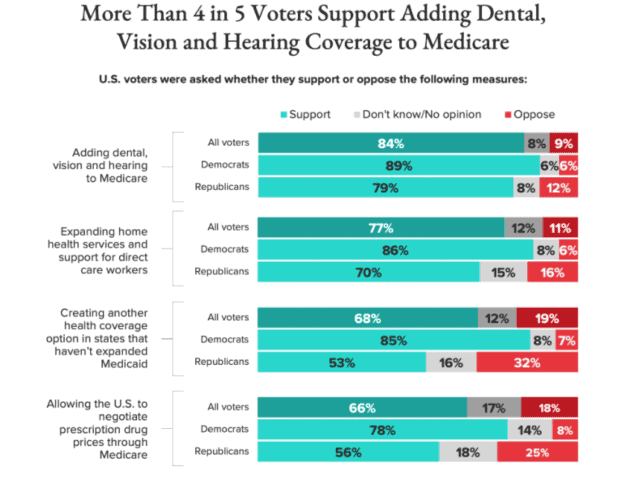
There appears to be new momentum on Capitol Hill for expanding Medicare. The most urgent expansion is adding dental, hearing, and vision coverage, because, as we have long argued, seniors need health care from the neck-up, too. Right now, millions of seniors forgo proper dental, hearing, and vision care because they simply can’t afford it. Neglecting this basic care has profound health consequences, which ultimately harms seniors and costs Medicare even more in the long run.
One thing is clear: the public wants Medicare expanded. According to a new Morning Consult poll, 84% of voters support adding dental, vision and hearing coverage to traditional Medicare. That number includes 79% percent of Republicans. Clearly, there is immense bipartisan support among everyday Americans for giving seniors these crucial coverages.

Morning Consult poll
Unfortunately, GOP leaders in Congress – chiefly, Senate Minority Leader Mitch McConnell – have opposed this commonsense expansion. McConnell has smeared the proposal as “adding an entitlement” and claims the country cannot afford it. Of course, Republicans made no such claim when they gave the wealthy and large corporations a $2 trillion tax break in 2017. Because the party apparently favors wealth-care over seniors’ health care, there likely are not ten Republican votes (enough to break a Senate filibuster) in favor of Medicare expansion.
In the face of GOP obstruction, Democrats are coalescing around a plan to enact Medicare expansion on a party-line vote through the budget reconciliation process. This is the same tactic they utilized in March for passing President Biden’s COVID relief plan. The Democrats would likely pay for expanding Medicare with savings achieved through prescription drug pricing reform. The House-passed Elijah Cummings Lower Drug Costs Now Act (H.R.3) would save Medicare some $450 billion over ten years, mainly by allowing the program to negotiate prices directly with Big Pharma.
The Morning Consult poll indicates that a majority of voters across party lines support Medicare drug price negotiations. Republicans in Congress have called this commonsense proposal “Socialism,” even though the V.A. has been negotiating prices with drug-makers for years – and realizing significant savings in the process. According to one analysis, Medicare could save some 40% in drug costs if it were allowed to negotiate as the V.A. does.
For the Democrats’ strategy to succeed, both Medicare expansion and prescription drug price reform would have to be enacted through budget reconciliation in the House and Senate. However, there is no guarantee that moderate Democrats in the Senate will support all of the drug pricing provisions in the current House bill. “It may have to be watered down somewhat to attract unanimous Democratic support,” says Dan Adcock, Director of Government Relations at Policy at the National Committee.
If drug pricing legislation is weakened in the budget reconciliation process, there will be less savings to the Medicare program. According to Adcock, that may limit the scope of dental, hearing, and vision coverage that can be added to Medicare. In fact, one or more of those coverages may not make it into the final legislation if there aren’t sufficient Medicare savings to pay for them.
“It’s possible we will see Medicare expansion enacted by the end of the year. It depends on how the Democrats are able to finesse this process. I wouldn’t bet the farm on it, but there’s a decent chance we’ll get something.” – Dan Adcock, NCPSSM Director of Government Relations and Policy
The first step in the process will be the passage of a budget resolution, which Adcock says could happen when Congress returns from its July 4th recess. However, he expects that the budget reconciliation process will not begin before this fall. The House and Senate would then vote on the reconciliation legislation. “It’s an important goal, but a long haul,” says Adcock.


